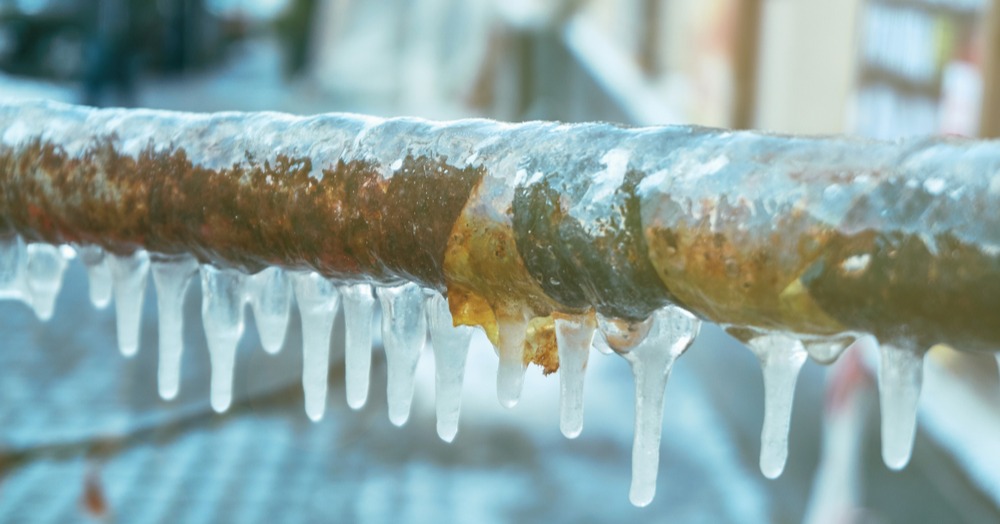High Density Polyethene (HDPE) piping is a versatile product suited for multiple applications in communications, oil and gas, power utility, municipal and water industries. The most common benefits cited for selection of HDPE over other piping solutions include its light weight, low cost, resistance to corrosion, strength, flexibility, reliability and recyclability. However, another unique benefit is HDPE piping’s specifications and temperature limits in extreme low temperatures.
In extreme cold weather, rigid pipes such as ductile iron and cast iron are more likely to fail from freeze damage when compared to HDPE piping. These pipe failures occur because of inline water freezing and expanding, and line breakages from shifting soil due to extreme temperature changes. When water in supply lines freeze it expands (by 9%) and pushes pipe outwards. As the outward force, known as hoop stress, increases pipes may burst.
More often pipe breaks occur due to soil movement. In-ground moisture freezing and thawing causes soil expansion and contraction which stresses buried pipe. Breakage failures typically occur at pipe joints, which are considered the weakest points in piping.
To avoid breaks from freezing, piping of all types and sizes should be buried at a depth greater than the expected depth of frost penetration. In general, smaller diameter pipes have a higher risk of breakage than larger sizes.
In early February 2021, several states, including Alabama, Oklahoma, Kansas, Kentucky and Texas, received a dose of abnormal and extreme cold weather from Winter Storm Uri. While some states fared better than others it was obvious that the water system infrastructure had not been winterized. Many municipalities were unable to maintain water service during the lengthy freezing temperatures.
Despite advanced warning that extreme cold conditions were imminent, little could be done to avoid water supply line failures. As a result, many businesses and homeowners were without water for consecutive days. In a press release, Texas Governor Greg Abbott reported, “We know that this past week has been challenging for far too many Texans. Our state agencies are working around the clock to restore power and water, and to ensure Texans have food and supplies.” Abbott went as far as to call in plumbers from out of state and to quickly renew licenses for plumbers whose certifications had lapsed.
Elsewhere in Texas, Houston’s Public Works department reported receiving more than 5,000 calls related to broken pipes. Austin reported a loss of 325 million gallons due to leakages. In Fort Worth more than 600 water main breaks were reported. Fort Worth Water Department spokesperson Mary Gugliuzza, speaking to NBC-DFW Channel 5, was asked about infrastructure and she commented, “We know that the cast iron pipes are a problem.”
As water supply infrastructure is installed and upgraded across the U.S., municipalities must consider HDPE as an alternative to rigid pipe in commercial applications, specifically in regions or areas that may not regularly experience sustained freezing temperatures.
HDPE pipe’s temperature limits help it remain ductile below freezing and it can withstand temperatures down to -94°F (-70°C). HDPE piping’s flexibility and elasticity allow water inside the pipe to freeze and thaw repeatedly without causing permanent damage.
Long-length sections of continuous HDPE pipe reduce the number of joints and potential failure points. HDPE joints are heat-fused and create a virtually seamless monolithic pipe.
To maintain water supply in extreme cold weather conditions, selecting the right product is essential for continued delivery of water service in extreme environments. HDPE is reliable and freeze tolerant and must be considered during design and selection or upgrading municipal water systems.
About Atkore - United Poly Systems
Atkore - United Poly Systems produces quality HDPE pipe in diameters from ¾-in. to 26-in. IPS, 4-in. to 24-in. DIPS and ¾-in. to 2-in. CTS for use in many industries including telecommunications, power utility, water, electrical and oil and gas. The market for HDPE pipe continues to expand as initiatives to improve, repair and expand the country’s infrastructure are implemented.
Our off-the-shelf HDPE conduit/pipe is available in a variety of sizes, colors, dimensions and lengths, with or without stripes. We also offer fully customizable HDPE conduit options. In addition, piping can be customized with a ribbed interior (to maximize the distance cable may be pulled or jetted), pull tape, or a lubricated interior (for easier installation).
Success at UPS can be attributed to our vast experience, extensive client relationships, state-of-the-art manufacturing and quality processes. Our agile business model that allows UPS to quickly meet customers’ needs without the overhead expenses that are incurred by many of the larger producers in the industry.
Conveniently located in Springfield, Missouri and Albuquerque, New Mexico, United Poly Systems can provide quick delivery to a majority of the U.S. market.

